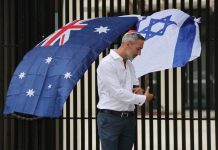For Australia, tension and diplomatic squabble between the U.S and China can be no good. China is the biggest trading partner of Australia while the U.S. remains its closest ally since the World War II.
The scuffle between the US and China leaves Australia in a difficult position. Secure friendship with Washington and face backlash from Beijing or strengthen ties with Beijing and risk decades-old alliance with Washington.
India, Australia Could Sign Pact For A Military Base In Andaman’s and Cocos Islands – Experts
Recently, the U.S-Australia relationship suffered a jolt when US secretary of state Mike Pompeo warned that Victoria’s Belt and Road agreement with China could see the US “simply disconnect” from Australia. He also said that such a deal could allow China to do ‘harm’ and threaten the Five-Eyes Partnership with Australia.
‘’We will not take any risks to our telecommunications infrastructure, any risk to the national security elements of what we need to do with our Five Eyes partners,” he said. The 56-year-old added that while he does not know the exact nature of the project, the US would simply separate if the deal has an adverse impact on the ability to protect telecommunications from private citizens, or security networks for defence and intelligence communities.
The southeastern state of Victoria remains the only state in the country which has signed a Belt and Road agreement with China. Victorian Premier Daniel Andrews has called the partnership important for Victorian jobs and remains confident that a good partnership between Australia and China is in everyone’s interest. The agreement fastracks China’s involvement in infrastructure projects in the state.
Australia-China Relations
For a developed country, the Australian economy is heavily dependent on China. Even though Canberra and Washington are allies when it comes to trade, China is the biggest market due to its geographical proximity and constant demand. Maintaining a balance between the two giants is risky and it recently proved why.
Chinese Military Base In The Pacific Near Australia Could Be A Nightmare For The US & Allies
Prime Minister Scott Morrisson and foreign minister Marise Payne are the reason behind the Chinese backlash Canberra has faced in recent weeks. Marise Payne took it upon herself to announce that Beijing and the World Health Organization are to blame for the spread of the coronavirus and issued the cry for an independent inquiry into the matter.
PM Morrison did try to rally support from the U.S. and the European Union but to no avail. To China, it appeared as an Australia vs China situation, wherein the former made no apparent attempt to discuss the proposed inquiry with the latter, but insisted that they must cooperate.
As expected, Beijing was furious with the developments with China’s ambassador to Australia warning of a possible boycott of Australian goods. The prophecy did come true as just weeks later Beijing blocked beef imports from four abattoirs, imposed new customs requirements on Australia’s iron ore and slapped a 40 per cent tariff on Australia’s barley exports. Although it gave some explanations for its decisions, Beijing’s exact reasons remain unclear.
How China Is Squeezing & Conquering The World With The Philosophy Of Sun Tzu?
Canberra pulled the plug on the independent inquiry and rightly so considering the economic impact of a fallout with China. Instead, it later focussed on what it should have done in the first place and supported the European Unions’ call for an independent inquiry with oversight from WHO.
US-Australia Ties
From Australia’s perspective, the U.S. is still its strongest ally. But how much Canberra can rely on Washington remains to be seen. Unlike the former Presidents who have graced the White House, Trump has a different approach to international relations.
He remains uninterested in leading the world at the time of crisis and does not feel the need to assert his power and position over international agencies. Instead, he acts irrationally, puts the interest of American people above the world and threatens to end international treaties and obligations.
While Donald Trump did support Australia’s call for an independent inquiry, he did so only via twitter and did not re-assure its support to Canberra when it faced a backlash from Beijing.
India-China Economic Warfare Intensifies; After FDIs, India Could Block FPIs From China Too
In the new global environment of mistrust and disorder, Australia will need to change the way it operates, writes Jonathan Pearlman. Pearlman is correct in his analysis and Canberra needs to hold its own and act without counting on support from the US.
Rather than being belligerent towards Beijing, Canberra should allow China an opportunity to act in good faith but still be wary of Chinese intentions.




